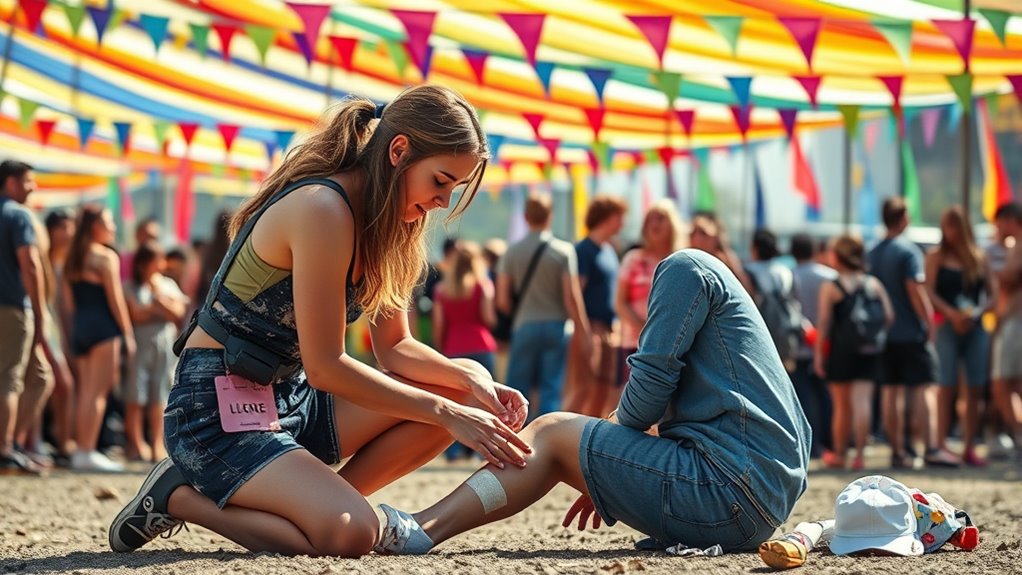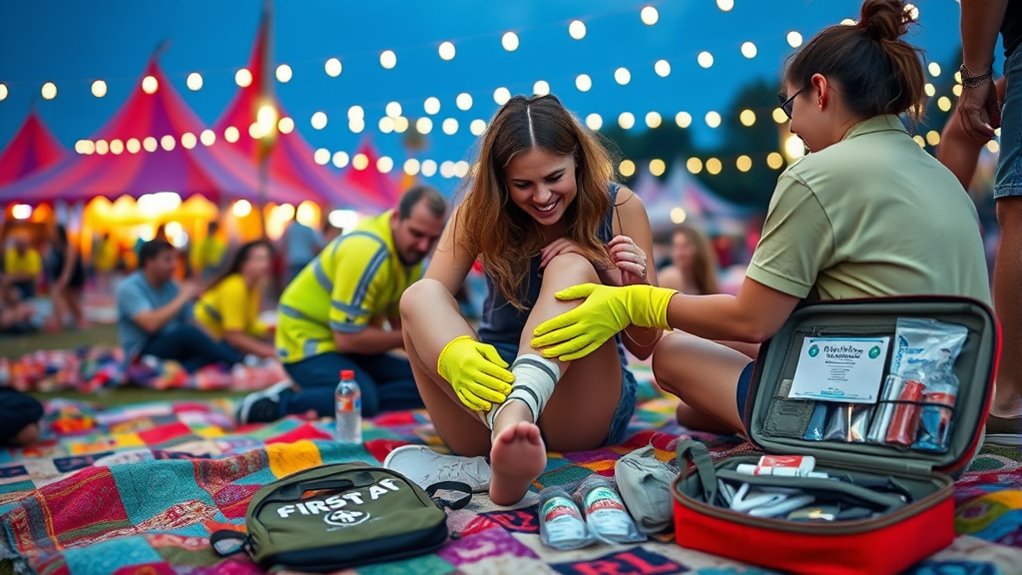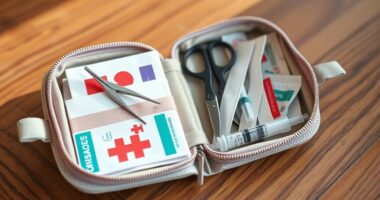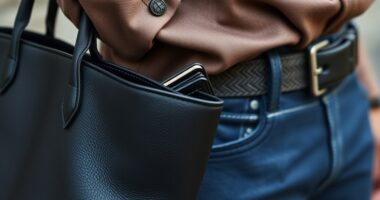To manage health emergencies at festivals, stay alert to your surroundings and identify nearby medical stations. Learn basic first aid skills like controlling bleeding with direct pressure, cleaning wounds, and helping someone who faints. Keep calm, communicate clearly with emergency services, and use your mobile phone wisely. Always have a well-stocked first aid kit handy. If you want to be prepared for various situations and handle emergencies confidently, there’s more to discover on this essential topic.
Key Takeaways
- Assess the situation quickly to determine the severity of the emergency and prioritize actions accordingly.
- Use a clean cloth and direct pressure to control bleeding and prevent further blood loss.
- Keep injured or faint individuals comfortable, hydrated, and in a safe, shaded area if possible.
- Know the location of the nearest medical station and communicate clearly with emergency responders.
- Maintain a calm demeanor, provide reassurance, and follow basic first aid procedures to stabilize the person until help arrives.

Have you ever wondered what to do if someone suddenly gets hurt or has a medical emergency? Knowing the basics of first aid can make all the difference in such situations, especially at festivals where help might not be immediately available. Your first priority is injury prevention—being aware of your surroundings and taking simple precautions can reduce the likelihood of accidents. Keep an eye on crowded areas to avoid trips or falls, and stay hydrated to prevent heat exhaustion or dehydration, which are common concerns at outdoor events. Wearing appropriate footwear and staying in well-lit areas also help prevent injuries. However, despite your best efforts, accidents can happen, so knowing how to respond quickly is crucial.
When an emergency occurs, effective emergency communication is crucial. Quickly evaluating the situation and calling for help is your first step. Ensure that you provide clear, concise information when contacting emergency services: your location, the nature of the injury, and the number of people involved. Using your phone to describe the incident accurately can save precious time for responders. If you’re with others, delegate someone to be the point person to communicate with emergency personnel, so you can focus on providing first aid. Also, keep a portable first aid kit handy, stocked with essentials like bandages, antiseptic wipes, and pain relievers. Knowing where the nearest medical station is located can facilitate faster assistance. Additionally, understanding the importance of a digital-friendly environment can help you access vital information quickly if needed.
While waiting for professionals, your role is to provide reassurance and basic first aid to the injured person. If someone is bleeding, apply direct pressure with a clean cloth to control the flow. For minor cuts or scrapes, clean the wound gently and cover it with a sterile bandage. If someone is feeling faint, help them to sit or lie down in a cool area and encourage hydration if they’re conscious. Be cautious about moving injured individuals unless absolutely necessary, as improper movement could worsen their condition. Remember, your calmness and clear communication help keep everyone safe and reduce panic. Familiarizing yourself with first aid techniques can significantly improve your ability to assist effectively in emergencies. It is also beneficial to understand how to safely manage injuries related to heat and other common outdoor health issues.
Frequently Asked Questions
How Can I Prevent Dehydration During a Festival?
To prevent dehydration during a festival, you should follow hydration tips like drinking water regularly, even if you don’t feel thirsty. Use water intake strategies such as carrying a refillable bottle and taking small sips throughout the day. Avoid excessive alcohol and caffeine, which can dehydrate you. Wear lightweight clothing, stay in the shade when possible, and listen to your body’s signals to stay well-hydrated and energized all day long.
What Should I Do if Someone Is Having a Seizure?
Imagine watching someone seize, their body jerking uncontrollably. You should stay calm and keep them safe from seizure triggers like sharp objects or crowds. Gently turn them onto their side to keep their airway clear, and cushion their head if possible. Follow seizure safety tips: don’t restrain them or put anything in their mouth. Stay with them until the seizure ends and help them rest afterward.
How Do I Recognize Signs of Heatstroke?
To recognize signs of heatstroke, look for symptoms like hot, dry skin, rapid heartbeat, confusion, or dizziness. It’s important to differentiate it from heat exhaustion, which often involves heavy sweating and weakness. Sunstroke symptoms also include nausea, headache, and loss of consciousness. If you notice these signs, act quickly by moving the person to a cooler place, cooling their skin, and seeking emergency medical help immediately.
What Are the First Steps for a Choking Incident?
When someone is choking, your first step is to ask if they’re okay and encourage them to cough if possible. If they can’t breathe or speak, identify choking hazards nearby. Perform the Heimlich maneuver by standing behind them, placing your hands above their navel, and giving quick, upward thrusts. Continue until the object is expelled or they can breathe again. Always call emergency services if the situation worsens.
How Can I Manage Minor Cuts and Scrapes Effectively?
Imagine a tiny cut turning into a disaster—don’t let that happen! You can manage minor cuts and scrapes by using first aid techniques like gently cleaning the wound with clean water and mild soap, then applying an antiseptic ointment. Cover it with a sterile bandage and keep an eye on it. Proper wound cleaning and quick action prevent infection, making sure your minor injuries stay minor.
Conclusion
Now that you’re equipped with first aid basics, you’re like a steady lighthouse amid a sea of festival chaos. When someone’s health falters, your calm hands and quick actions light the way through the storm, guiding them back to safety. Remember, your confidence can turn panic into hope. With every step you take, you become a beacon of reassurance, ensuring everyone around you feels protected and cared for, no matter what surprises the festival might bring.










